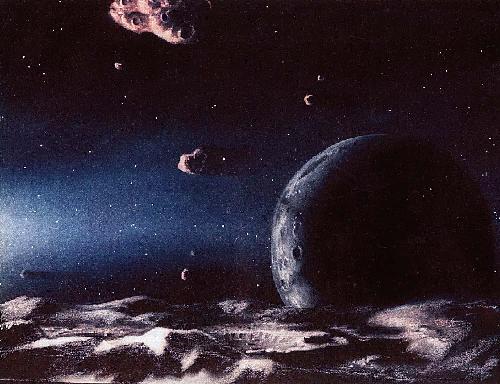 |
 |
||
| Comet | Jewitt | Kuiper | Irregular Satellites |
|---|
| IS PLUTO A PLANET? WHAT IS A PLANET? |
|---|
Planet-hood
I've tried to avoid the "is Pluto a planet?" issue as far as
possible because I think it is essentially bogus and scientifically
it is a non-issue. But I'm getting so many questions following the
2006 Aug 16th IAU proposal that I think this page is needed.
What the IAU Proposed on August 16th
Their proposal is linked as a
text file.
In a nutshell, they propose the following:
OLD SOLAR SYSTEM
Mercury, Venus, Earth, Mars, Jupiter, Saturn, Uranus, Neptune, Pluto (9 Planets)
IAU SOLAR SYSTEM
Mercury, Venus, Earth, Mars, Jupiter, Saturn, Uranus, Neptune (8 "classical" planets")
Ceres (1 big asteroid)
Pluto, Charon (Pluto's satellite) and 2003 UB313 (3 "Plutons").
But, having set up these distinctions, the IAU then clouds the issue by asserting that "they are all planets", meaning that asteroid Ceres and Pluto's moon Charon are just as much planets as is Jupiter, in their eyes. That doesn't make any sense. By their definition, all sorts of other "round" objects must be labelled planets. Moreover, the proposed system complicates and confuses the issues, rather than simplifying and clarifying them.
My reading of the IAU language is given here.
Unfortunately, the IAU committee is stuck between a rock and hard place. The public assumes that there should be a tight definition of what makes a planet and further assumes that the IAU has the responsibility to make that definition. The public also seems attached to the planet label for Pluto, which limits the range of options open to the IAU (given that they would not want to make a definition which brings public scorn upon them). At the same time, the IAU is a science organization, and they don't want to do anything too crazy (I assume) in the eyes of astronomers. The result is the compromised, lawyerly language of the IAU proposal. I feel their pain...there is no good answer to "what defines a planet?" and yet they have been asked to make such a definition. Their big mistake was to agree to do so.
Sadly, in trying to satisfy divergent audiences, the IAU committee has written a definition that is too complicated to be useful to the public and which simultaneously lacks any scientific value. The proposal should be rejected on these and other grounds. The editors of the New York Times (2006 Aug 17) say this nicely.
The Scientific Perspective
The properties of the
Kuiper belt as uncovered over the last 14 yrs
clearly show Pluto in its proper context as a large Kuiper Belt Object (KBO).
There are many other objects with similar
orbits and even a few other
KBOs that are about the same size (2003 UB313 is the same size as Pluto
within the uncertainties of measurement and there are
many
1000km scale KBOs). So, Pluto is certainly a large
KBO.
Scientifically, whether Pluto is also a planet is a non-issue. No scientific definition of planet-hood exists or is needed. Is that a boat or a ship? It doesn't matter if you are using it to float across the ocean. Scientists are interested in learning about the origin of the Solar system, and setting up arbitrary definitions of planet-hood is of no help here.
What does make sense is to lump together similar objects and then to make scientific advances by comparing their properties as groups. In this sense, the Solar system divides into 3 Domains:
The Domain of the Rocky Planets:
4 rocky planets (Mercury, Venus, Earth, Mars) and the ring of debris in the asteroid belt
The Domain of the Giant Planets:
4 giant planets (Jupiter, Saturn, Uranus and Neptune)
The Domain of the Comets:
Oort cloud and Kuiper belt
A classification into groups like this has scientific merit because it distinguishes objects that are clearly very different and so points us to ask "why?". The IAU proposal heads in this direction by separating "classical" planets from a big asteroid and from "Plutons" but then subverts itself by saying "but they're all planets, anyway".
Reasons to Classify Pluto as a Planet
1) Nostalgia. It's always been a planet. This is the often-mentioned
"cultural" reason, although I don't see the "cultural" component and,
in any case, science respects data, not culture (if it doesn't, we're
all finished!).
2) Politics. It is often asserted that Lowell Observatory in 1930 hyped Pluto as a planet in order to maximize the publicity from this discovery (e.g. see Dan Green's discussion). Caltech has done much the same with regard to the discovery of 2003 UB313, although less consistently than Lowell Observatory. Other groups have self-interest of a different sort. If Pluto is not a planet, why did NASA spend 600M$ to send a spacecraft there under the impression that it was going to visit "the last planet"? (in fact there are reasons to do so, but they become harder to explain to a politician or an administrator if the planet label is lost and Pluto is just "one of the guys").
Reasons to Not Classify Pluto as a Planet
Calling Pluto a planet opens a Pandora's box of planets that clouds the real
significance of the many and varied types of body we find in the Solar
system. Do we really learn anything by lumping Pluto and its diminutive
satellite Charon as planets together with the Earth and Jupiter? Methinks not.
Still my favorite comments about this whole fiasco are from Pluto itself.
David Jewitt.
 |
 |
||
| Comet | Jewitt | Kuiper | Irregular Satellites |
|---|